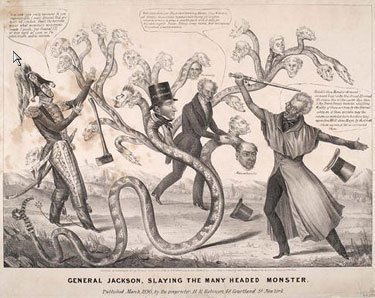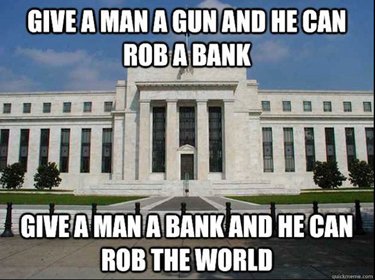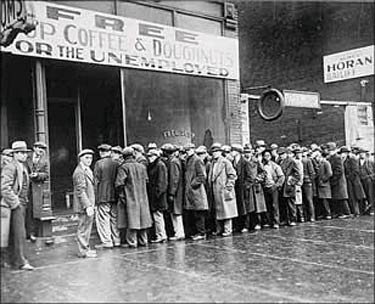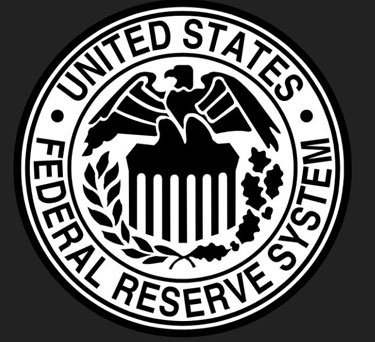Category Archive 'Federal Reserve'
06 Apr 2016


George Gilder explains that the ability of Wall Street to get rich while Middle Class America sinks deeper into unending recession doesn’t really have anything to do with Hispanic immigrants or Free Trade. The real cause is the nationalization of capital. These days Washington picks all the winners, and if you aren’t Goldman Sachs or the like, you haven’t got the necessary blat to be receiving any favors.
Why does Wall Street keep recovering after recessions but the economy seemingly never does?
The reason, as I document in my book, “The Scandal of Money: Why Wall Street Recovers but the Economy Never Does” is that Washington and the Federal Reserve together have created a closed loop economy where the Fed creates money for the government and the S&P 500 and Main Street is left out.
The Fed decides what money is worth and who receives it and how much. The Fed prices it at zero interest rates, allegedly to stimulate economic growth. But whenever something is free, it’s distributed by queue, and only the privileged, connected people in the front of the line get any, not the innovators who create growth and opportunity for Main Street. Trump voters are wrong if they blame Mexico and China, but they are right about one big thing: The economy is rigged against them.
The Fed takeover of the economy has turned Main Street into Mean Street; it has gelded Silicon Valley, reducing our most creative entrepreneurs to climate cranks obsequiously petitioning in Washington.
Almost two-thirds of jobs created between 2002 and 2010 came from 23 million small businesses, according to the Small Business Administration. But venture capital investment in 2014 of $48 billion is just one-third of the 2000 total (in 2015 dollars), according to the National Venture Capital Association. There were half as many IPOs in 2015 as in 2000, and they were mostly focused on a few large deals. Back in 1999, there were seven times more IPOs than mergers and acquisitions for tech companies. Today merger and acquisitions outnumber IPOs by almost 36 to 1.
The Fed regulations and money manipulations have displaced an open market of IPOs by an exclusive game of horse trading among “qualified investors” who get rich and leave Main Street out, and fail to create new jobs.
And Wall Street? The once powerful engine of capitalism has been nationalized by the Obama bureaucracies feeding on fines and fees. We’ve had a covert socialist coup in Washington and it must be reversed or the free enterprise engine of growth and opportunity is in jeopardy.
Read the whole thing.
14 Jun 2014


Tyler Durden quotes Charles Hugh-Smith & Bart describing how modern statism manages to keep the serfs locked in and under control.
I’ve been discussing the essence of Neofeudalism this week: those with access to the low-interest unlimited credit spigot of the Federal Reserve become more equal than others–the perfect Orwellian description of a Neofeudal arrangement in which financial leverage buys not just rentier assets but political power and control.
Neofeudalism depends on the cultural supremacy of Neoliberalism, the belief that the social order is defined and created by markets: if markets are free, participants, society and the political order are also free.
This conceptual framework is the perfect enabler for the dominance of credit-based, leveraged capital, i.e. Neofeudalism. In a “free market,” those with access to nearly-free money can outbid everyone who must rely on savings from earned income to finance borrowing. In a “free market” where those with access to leverage and unlimited credit are more equal than everyone else, the ability of wage earners to acquire rentier assets such as rental housing, farmland and timberland is intrinsically limited by the financial system that makes credit and leverage scarce for the many and abundant for the few.
Those with access to the low-interest unlimited credit spigot of the Federal Reserve are free to snap up tens of thousands of houses and tens of thousands of acres of productive land–the classic rentier assets that reliably produce unearned income because people need shelter and food–along with other rentier assets such as parking lots and meters, fossil fuels in the ground, and of course the engines of credit creation, the banks.
Longtime correspondent Bart D. recently summarized how this Neofeudal arrangement enables the few to control the many:
What if financial elites enter the market with their ‘free’ Federal Reserve cash and buy up a lions’ share of accommodation to keep home ownership unaffordable and force the majority to live as renters? If, in a dwindling economy, the Power Elite can’t hold power over the masses by keeping their jobs or other income streams under threat, maybe they will switch to wanting everyone to owe them rent and use the threat of homelessness as another tool to keep people under control.
It’s an extension of the food stamps concept. The system is moving towards making sure most people don’t have future access to the resources that enable them to survive and create wealth outside of the system.
I think the economy is now about controlling people. We are headed for a societal structure in which opportunities to rise economically will be increasingly stifled by those at the top. The money is irrelevant now, the real game is being played is in controlling tangible and ‘essential for life’ assets: housing, water delivery, food, clothing, energy. Those at the top want power to control everyone below them, particularly to keep them from revolting.
…
Load every person with a gargantuan student loan and an equally enormous mortgage and toss on an auto loan and credit card debt, and you have the perfect serf, too busy servicing his debt to question the arrangement, much less resist it.
People in the lower orders can resist by securing their own productive assets, but this takes effort, foresight, discipline and planning–all the characteristics that are eroded in a consumerist market economy that glorifies and promotes instant-gratification consumption.
This reduction of selfhood to consumption insures the brainwashed consumer has neither the savings nor the cultural tools needed to acquire financial and social capital. Debt-based consumerism insures the lower orders will never have the means to escape the Neofeudal arrangement.
03 Dec 2012


Clark Judge, at Ricochet, explains that though the federal government has been been enormously, fantastically expanding the money supply, the new electronically created dollars have not actually fueled an expansion of business credit.
A successful software entrepreneur and school friend sent me this chilling email last week:
Yesterday I was speaking to a banker in central California who related how he is being prevented from doing his job due to the compliance people (read government pressures) and could not convince the powers-to-be to make a loan despite his long history of good decisons. I hear stories daily regarding how people have seen orders evaporate as a result of the election. Multply this across the nation to understand the impact.
But how could loans be scarce when the Fed has been printing money at an unprecedented rate?
Here is Cato Institute and Johns Hopkins economist Steve Hanke’s explanation, from a recent EconTalk podcast:
[S]tart with Lehman’s collapse in September 2008. That’s a convenient date. Since that point in time, the Federal Reserve’s balance sheet has increased roughly by three and a half times. So that means they are buying a lot of these [U.S. government] bonds….
Now that means that high-powered money, or what I call state money–the amount of money produced by the state–has more or less tripled. It’s exploded…. [S]tate money has increased from about 6.5% of the total money supply, when you measure the money supply properly with a broad measure, like M3–so we went from state money being at about 6.5% at the time Lehman collapsed, until now it’s about 15% ….
[In other words] state money is peanuts. What really is important is bank money–and bank money is created by the commercial banking system and shadow banking system, and that’s what really counts.
So, in a way we have had the following scenario develop after Lehman: We’ve had ultra-loose monetary policy with regard to state money and the Federal Reserve.But with the financial regulation that was legislated with Dodd-Frank, and also with what is called the Basel capital requirements, and specifically Basel III, which is being imposed on banks–to increase the capital-asset ratios of the banks.These two things–financial regulation and Basel–have in effect imposed ultra-tight monetary policy on the banking system and bank money.
So, as a result of the two, we’ve had the total amount of the money supply actually being very anemic, not growing very much at all. And in fact, if you look at a trend line since 2009 and look at the endpoint today of the trend line as you are going left to right, that point is about 7.5% higher than the actual level of the money supply that we have.
So, you could argue that relative to trend we’ve got a deficiency of about 7.5% in broad money. And the reason why is that the dominating feature has been the reregulation of banks and the tight monetary policy imposed on bank money. Which accounts for 85% of the total amount of money in the economy.
Basel III is an international banking agreement — one of a series dating to the late 1980s — that is imposing increased reserve requirements on major money center banks globally, and is being applied in the U.S., it turns out, on regional banks, too. Thanks to it and Dodd-Frank, regulators are forcing U.S. banks to shift their portfolios toward U.S. government debt and other assets that qualify as reserves. This is, of course, very convenient at a time of World War II-scale federal borrowing needs made bigger by the president and his Congressional allies insisting on more entitlement and other domestic spending, meaning more debt, not less.
14 Apr 2012


Worried about income inequality? Sheila Blair has a cure for the problem. Just make the federal government treat everybody the way it treats big banks.
Are you concerned about growing income inequality in America? Are you resentful of all that wealth concentrated in the 1 percent? I’ve got the perfect solution, a modest proposal that involves just a small adjustment in the Federal Reserve’s easy monetary policy. Best of all, it will mean that none of us have to work for a living anymore.
For several years now, the Fed has been making money available to the financial sector at near-zero interest rates. Big banks and hedge funds, among others, have taken this cheap money and invested it in securities with high yields. This type of profit-making, called the “carry trade,†has been enormously profitable for them.
So why not let everyone participate?
Under my plan, each American household could borrow $10 million from the Fed at zero interest. The more conservative among us can take that money and buy 10-year Treasury bonds. At the current 2 percent annual interest rate, we can pocket a nice $200,000 a year to live on. The more adventuresome can buy 10-year Greek debt at 21 percent, for an annual income of $2.1 million. Or if Greece is a little too risky for you, go with Portugal, at about 12 percent, or $1.2 million dollars a year. (No sense in getting greedy.)
Think of what we can do with all that money. We can pay off our underwater mortgages and replenish our retirement accounts without spending one day schlepping into the office. With a few quick keystrokes, we’ll be golden for the next 10 years.
Read the whole thing.
I bet she can convert a lot of conservatives into going along with this one.
12 Jun 2009


Household Net Worth as Percentage of GNP
Well, we’ve recently on the average lost the last decade’s growth of personal assets.
Household Net Worth, according to the Fed, is down $14 trillion from its peak in 2007, and as the chart above illustrates, is down to levels very much like those of the 1990s when we were just beginning to emerge from a painful recession.
All over the country, current bad times have forced families to dip into savings, to sell equities at drastically reduced values, and to liquidate real estate in a very unfavorable market.
The impact of Barack Obama’s spending binge, of course, and the new regime of government regulation, intrusion, and control over the economy is really still yet to be felt.
Arthur Laffer, in the Wall Street Journal, contemplates what government has done so far, and shudders at the consequences yet to come.
It’s difficult to estimate the magnitude of the inflationary and interest-rate consequences of the Fed’s actions because, frankly, we haven’t ever seen anything like this in the U.S. To date what’s happened is potentially far more inflationary than were the monetary policies of the 1970s, when the prime interest rate peaked at 21.5% and inflation peaked in the low double digits. Gold prices went from $35 per ounce to $850 per ounce, and the dollar collapsed on the foreign exchanges. It wasn’t a pretty picture.
21 Dec 2008

James Grant, in the Wall Street Journal, points out that the Bernanke Federal Reserve policies of inflating our way out of recession are practically certain to produce worse than a recession.
It was on Oct. 6, 1979, that then-Fed Chairman Paul A. Volcker vowed to print less money to bring down inflation. So doing, he closed one monetary era and opened another. With Tuesday’s promise to print much more money, the Federal Reserve of Ben S. Bernanke has opened its own new era. Whether Mr. Bernanke’s policy of debasement will lead to as happy an outcome as that which crowned the Volcker anti-inflation initiative is, however, doubtful. Whatever the road to riches might be paved with, it isn’t little green pieces of paper stamped “legal tender. …
The seasons of finance are unpredictable. Prescience is rare enough in the private sector. It is almost unheard of in Washington. The credit troubles took the Fed unawares. So, likely, will the outbreak of the next inflation. Already the stars are aligned for a doozy. Not only the Fed, but also the other leading central banks are frantically ramping up money production. Simultaneously, miners and oil producers are ramping down commodity production — as is, for instance, is Rio Tinto, the heavily encumbered mining giant, which the other day disclosed 14,000 layoffs and a $5 billion cutback in capital expenditure. Come the economic recovery, resource producers will certainly increase output. But it is far less certain that, once the cycle turns, the central banks will punctually tighten.
The public has been slow to anger in this costliest and scariest of post World War II financial crises. Wall Street and the debt ratings agencies have come in for well-deserved castigation. But pointing fingers rarely find the Federal Reserve, whose low, low interest rates helped to set house prices levitating in the first place.
After Mr. Bernanke gets a good night’s sleep, he should be called to account for once again cutting interest rates at the expense of the long-suffering (and possibly hungry) savers. He should be asked to explain how the central-banking methods of the paper-dollar era represent any improvement, either in practice or theory, over the rigor, elegance, simplicity and predictability of the gold standard. He should be directed to read aloud the text of critique by Elihu Root and explain where, if at all, the old gentleman went wrong. Finally, he should be directed to put himself into the shoes of a foreign holder of U.S. dollars. “Tell us, Mr. Bernanke,” a congressman might consider asking him, “if you had the choice, would you hold dollars? And may I remind you, Mr. Chairman, that you are under oath?”
Thank goodness, we lost the election! If the government is going to screw up the economy royally by pursuing short-sighted liberal economic policies, let’s have democrats doing that.
20 Sep 2008

Investors Business Daily observes that, although the left is ready to blame the subprime fiasco on an insufficiency of regulation, as lenders eliminated credit standards, government was right there encouraging their actions.
Commercial banks threw lending standards out the window in their rush to get new business. Like S&Ls of the 1980s, they would have gone wild without Gramm-Leach-Bliley. Washington, if anything, egged them on, but not because of free-market dogma. Banks and mortgage brokers were pumping up the homeownership numbers in America, and politicians were eager to take credit for that.
Wall Street, meanwhile, became a victim of its own innovation. It created new classes of derivative investments that spread — and, through leverage, amplified — the risk from the subprime mortgages produced by the banks. A new multitrillion-dollar market emerged almost overnight, lacking in transparency and reliable price signals. With their asset values in doubt, investment banks lurched toward insolvency.
If regulators failed here, it wasn’t because of policies adopted years before. It was more of the same story that has played itself out over and over in modern finance: Innovation races ahead of the rules. Crises tend to take almost everyone by surprise — including the major players as well as the regulators.
Read the whole thing.
29 Mar 2008

Ronald Reagan said: “The government’s view of the economy could be summed up in a few short phrases: If it moves, tax it. If it keeps moving, regulate it. And if it stops moving, subsidize it.”
Democrat Barack Obama promises to do all that:
In a major economic address at Cooper Union today, Senator Barack Obama called for immediate relief for homeowners hit by the housing crisis, modernization of our regulatory framework, and an additional $30 billion stimulus package to jumpstart the economy and help protect families from the economic slowdown. …
In his speech today, Obama made the case that while markets are the engine of American progress, the government’s role as umpire and steward is critical to the function of the free market. For too long, he said, special interests have been able to bend the rules to maximize their profits on the backs of hardworking Americans.
Obama pledged to restore confidence in the markets, tackle the housing crisis and protect families from the economic slowdown by:
Ø Creating 21st century standards for transparency and oversight of the financial system in order to prevent future abuses and crises.
Ø Providing immediate relief to homeowners hit by the housing crisis.
Ø Enacting a second stimulus package to stabilize and strengthen the economy, provide aid to homeowners and states hardest-hit by the housing crisis, and extend and expand unemployment insurance.
But who needs Obama? Even if the democrats don’t win, Republicans like George W. Bush, and certainly John McCain, will do nearly every bit of very much the same.
Bloomberg:
Treasury Secretary Henry Paulson is likely to call for the creation of new regulatory agencies with broad powers over lending, the securities industry and business conduct, according to the draft of a study he commissioned.
The report, which recommends more power for the Federal Reserve, also proposes combining the Office of Comptroller of the Currency — which dates back to the Civil War — and the Office of Thrift Supervision into a single banking overseer. In addition, the draft, which was circulated to government agencies this week and obtained by Bloomberg News, calls for the merging of the Securities and Exchange Commission and the Commodity Futures Trading Commission.
New York Times:
The Treasury Department will propose on Monday that Congress give the Federal Reserve broad new authority to oversee financial market stability, in effect allowing it to send SWAT teams into any corner of the industry or any institution that might pose a risk to the overall system.
The proposal is part of a sweeping blueprint to overhaul the nation’s hodgepodge of financial regulatory agencies, which many experts say failed to recognize rampant excesses in mortgage lending until after they set off what is now the worst financial calamity in decades. …
According to a summary provided by the administration, the plan would consolidate an alphabet soup of banking and securities regulators into a powerful trio of overseers responsible for everything from banks and brokerage firms to hedge funds and private equity firms.
03 May 2006
Columbia Business School’s Follies Student Comedy Revue hints darkly that George W. Bush should have appointed their own Dean, R. Glenn Hubbard, instead of Ben S. Bernanke, to replace Alan Greenspan as Federal Reserve Chairman.
video
——————————————
Hat tip to Brian Carney.
10 Dec 2005

Not so very long ago, almost universally accepted common wisdom blamed the Great Depression on “the excesses of capitalism,” and believed that it was Franklin Delano Roosevelt and the New Deal which saved the capitalist system from itself by the addition of social welfare and more intense federal management of the economy. As the Wall Street Journal reports, the world has since turned upside down:
For decades, many economists and policy makers thought the Depression was the inevitable consequence of excess investment, flawed corporate governance and speculation in the 1920s, culminating in the 1929 stock-market crash. That view was reinforced by John Kenneth Galbraith’s 1955 book “The Great Crash, 1929.”
Milton Friedman and Anna Jacobson Schwartz upended that view in 1963. In “A Monetary History of the United States, 1867-1960,” they argued that the Depression was far from inevitable, but brought about by an “inept” Federal Reserve. First, they said, the Fed foolishly raised interest rates in 1928 to end speculation on Wall Street, causing a recession the next year that precipitated the crash. Then, it let thousands of banks fail and the money supply shrink. In part, it thought weak banks should be allowed to fail. It also feared that lower interest rates might lead foreigners to dump dollars, straining the currency’s link to gold.
Mr. Bernanke read the book as a graduate student at Massachusetts Institute of Technology in the 1970s. “I was hooked, and I have been a student of monetary economics and economic history ever since,” he recalled at a 2002 conference honoring Mr. Friedman’s 90th birthday. Mr. Bernanke, by then one of the Fed’s seven governors, told Mr. Friedman: “Regarding the Great Depression. You’re right, we did it. We’re very sorry. But thanks to you, we won’t do it again.”
Your are browsing
the Archives of Never Yet Melted in the 'Federal Reserve' Category.
/div>

Feeds
|








